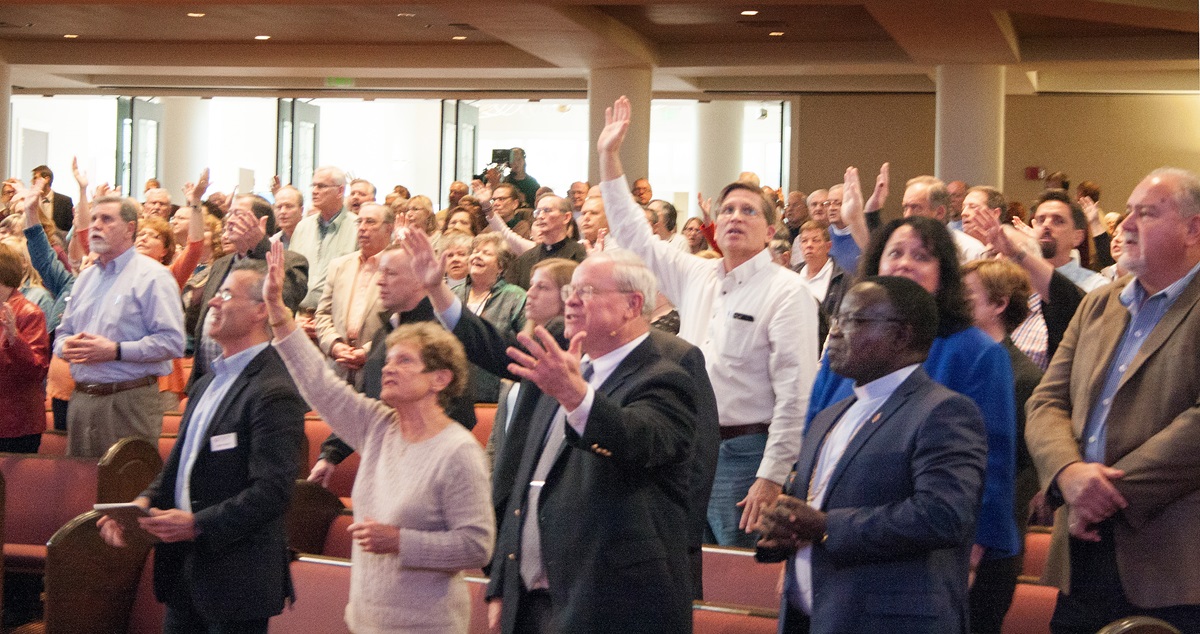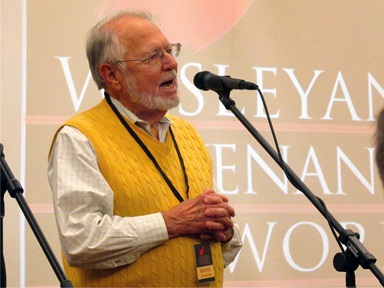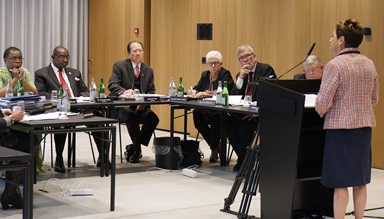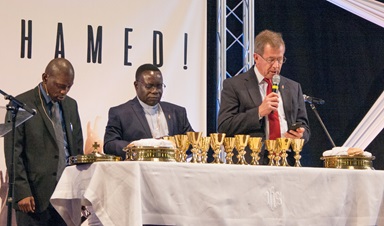Wesleyan Covenant Association leaders have started publicizing the group’s plans for responding to whatever the special General Conference does next month.
The unofficial advocacy group’s overall message to its members: Hold tight for now but know contingency plans are in the works that could include departure en masse from The United Methodist Church.
Still, the association is getting some pushback for preparing for a possible split even before the denomination’s top lawmaking assembly meets Feb. 23-26 in St. Louis.
The Wesleyan Covenant Association has formed a 16-member Next Steps Working Group and has set aside the dates of April 25-26 for a Convening Conference that would potentially start a new denomination.
However, association leaders have not decided on a location of the meeting or even if they will end up holding the conference at all. The association’s council will meet in closed session immediately following the special General Conference to determine if that is the direction the group should take.
“The temptation may be to immediately send letters of withdrawal from The United Methodist Church,” said the Rev. Paul Lawler, president of the North Alabama WCA regional chapter, in a letter to chapter members. “We urge churches and pastors to participate in the convening conference if necessary and to take steps to withdraw in concert with one another.”
The Rev. Hugh Griffith, president of the Mississippi WCA regional chapter, said in a subsequent message to his chapter that the WCA’s preference is not to leave but to lead a renewed United Methodist Church.
“If the WCA wanted to split, wouldn’t we have split a long time ago in order to avoid the drama and anguish of this difficult season?” he wrote. “Our highest hope is the faithful renewal of our United Methodist Church.”
At the special General Conference, 864 delegates from around the globe — some affiliated with the WCA — will work on determining what direction the church should take in its longstanding debate over homosexuality. The decades-long impasse already has some congregations, including at least one led by an association leader, heading for the exits.
Bishop Cynthia Fierro Harvey, president-designate of the Council of Bishops and leader of the Louisiana Conference, said it is disconcerting to see a track for departure at work. The bishops appointed the Commission on a Way Forward and called the special General Conference to take up its proposals to help the church stay together.
“As in any time of grief, pastors often counsel those who have lost a loved one to not make any major decisions for at least a year,” she said. “I remind our Louisiana pastors and laity that we don’t actually know what is going to happen in St. Louis; and that we don’t know how the decisions will impact our ministry. We simply don’t know how it will feel; therefore, we should not make any hasty decisions.”
Instead, she encourages United Methodists to seek to respond to the Holy Spirit.
Currently, the denomination officially prohibits “self-avowed practicing” homosexual clergy and the blessing of same-sex unions. But a number of United Methodists have publicly defied these prohibitions.
In October 2016, the newly created Wesleyan Covenant Association put denominational leaders on notice that they should hold clergy accountable on restrictions related to homosexuality or prepare for a denominational split.
Since then, the association has grown and says it now represents 125,000 people in 1,500 churches. The association also has established chapters in almost every U.S. conference, with others just waiting to complete legal paperwork.
This past November, the association held its own global legislative assembly. Among other steps, the group passed a resolution that said passage of the One Church Plan, one of the proposals heading to the special General Conference, would be “untenable and would force us to leave.”
The One Church Plan, which a majority of bishops including Harvey support, would leave questions of same-gender marriage up to local churches and individual clergy and questions of LGBTQ ordination up to conferences. The plan adds protections for clergy and bishops who as a matter of conscience feel they can’t officiate at such unions or ordinations.
Lawler’s letter speculated that even if the One Church Plan doesn’t become policy, there is a 70 percent chance the association will call a convening conference if no enhanced enforcement provisions pass.
The Wesleyan Covenant Association is pushing for the Modified Traditional Plan. That proposal adds to the Traditional Plan, which strengthens enforcement mechanisms for current policies, requires bishops and conference to certify their support and establishes a way to encourage the exit of those who won’t agree to uphold the rules.
The Modified Traditional Plan augments the accountability section by adding a $200,000 grant to annual conferences leaving the denomination to help pay for transitional expenses. The General Council on Finance and Administration, the proposal says, can fund these grants using reserves held by the denomination’s general agencies. The Modified Traditional Plan also creates a new global episcopacy committee to hold bishops and conferences accountable.
The Judicial Council, the denomination’s top court, has already ruled portions of the Traditional Plan do not pass muster under the denomination’s constitution. Specifically, the court said certain parts strayed in how they handled due process or elevated policies related to homosexuality above all church requirements.
Backers of both the Traditional and Modified Traditional Plans say the legislation can be amended at General Conference to bring the plans in line with the constitution.
Lawler said he sent the letter to the North Alabama WCA chapter with the hope of easing anxiety. The senior pastor of Christ Church in Birmingham, Alabama, said his goal was to assure people there are contingency plans in place.
The Rev. David Barnhart is the pastor of Saint Junia United Methodist Church, also in Birmingham, and considers Lawler a mentor. Saint Junia identifies itself as part of the Reconciling Ministries Network, which advocates for equality of LGBTQ Christians in all aspects of church life.
He said he grieves that he has peers in his conference who don’t want progressives like him in their churches. But he’s in no rush to leave The United Methodist Church.
“Anything can happen at General Conference,” he said. “I’m going to do ministry, and our ministry involves good news to all people.”
Lawler’s letter sparked criticism from the Rev. Mark Holland on the blog of the unofficial advocacy group Mainstream UMC, which he started to promote the One Church Plan
“This is the part that I believe is disingenuous,” said Holland, a General Conference delegate from the Great Plains Conference. “If you are leaving no matter what, why are you trying to reorganize the church you’re leaving?”
The Rev. Keith Boyette, president of the Wesleyan Covenant Association, disagreed with Holland’s characterization.
“For others to say we’re leaving no matter what the General Conference does, that would be incorrect,” Boyette said.
“We’re committed United Methodists,” he added. “We believe the current Disciplinary standards in The United Methodist Church are biblical and entirely appropriate, and we’re not the ones who believe it ought to be changed.”
Hahn is a multimedia news reporter for United Methodist News Service. Contact her at (615) 742-5470 or newsdesk@umcom.org. To read more United Methodist news, subscribe to the free Daily or Weekly Digests.Like what you're reading? Support the ministry of UM News! Your support ensures the latest denominational news, dynamic stories and informative articles will continue to connect our global community. Make a tax-deductible donation at ResourceUMC.org/GiveUMCom.




